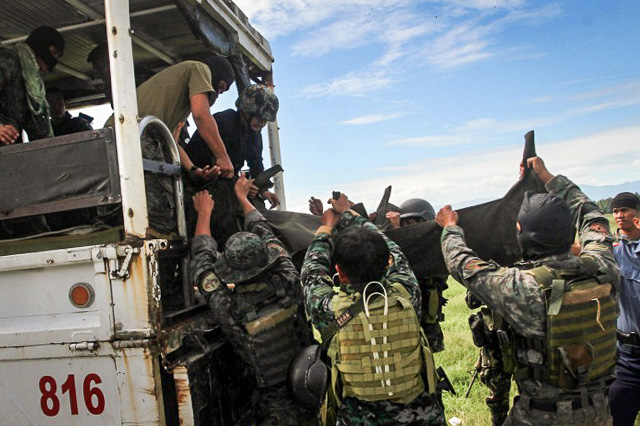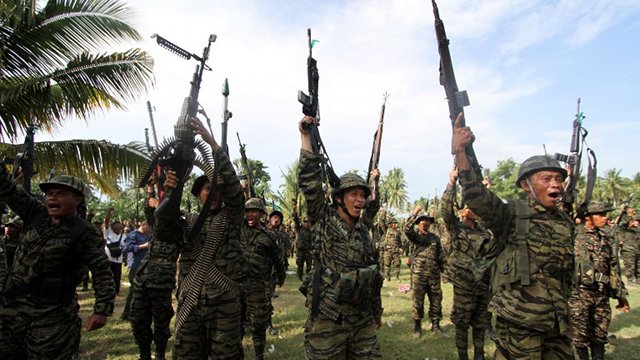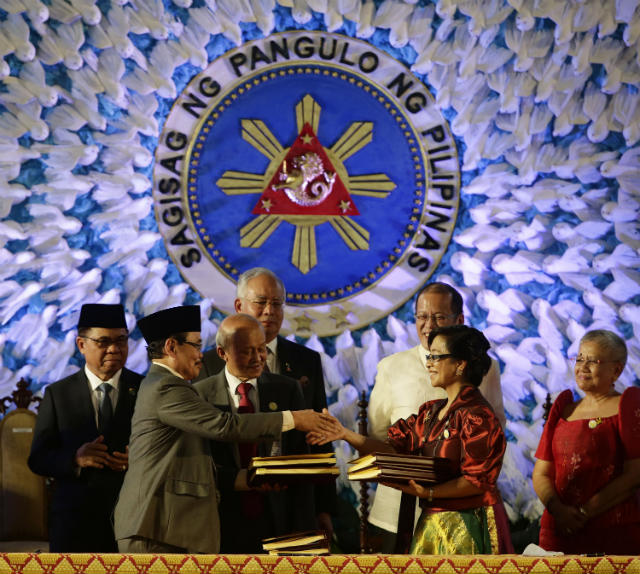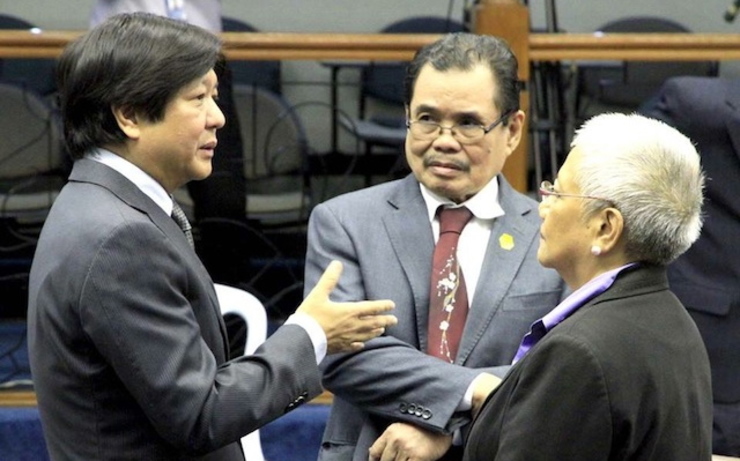Grand gestures are needed to restore confidence in the peace process

'MISENCOUNTER.' Philippine police commandos load body bags onto a truck in the town of Mamasapano, in Mindanao on January 26, 2015. Photo by Mark Navales/AFP
At least 44 policemen are dead. Hearings on the proposed Bangsamoro Basic Law are stalled at the Senate. Now, what?
Despite
continuing support from certain Congress leaders and other sectors such as the Catholic Church, the
ongoing peace process in Mindanao lost key numbers in the Senate
after the Maguindanao clash, casting doubts on the future of
the peace process.
In the midst of
strong emotions, even former president and incumbent Manila Mayor Joseph
Estrada, in an interview with ANC, said the Maguindanao clash – which
government officials are calling a "misencounter" – only shows that
he was right in declaring an all-out war against the MILF back in 2000.
After the
euphoria over the signing of a final peace agreement between
the government and the Moro Islamic Liberation Front (MILF) in March 2014,
all 17 years of negotiations between the government and the MILF and close to
half a century of armed conflict now hit another crossroad.
In Congress,
lawmakers are demanding to know how and why over 40 policemen were killed after
they entered an MILF-controlled area in Maguindanao in a bid to arrest wanted terrorists.
(READ: PNP-SAF commander relieved over
'misencounter')
Will the incident
jeopardize the peace process? If the statements of government
officials after the attack is any indication, then the government's
stand is clear: the peace process with the MILF will continue.
On Tuesday,
January 27, government chief negotiator Miriam Coronel-Ferrer told reporters in
several interviews that the scheduled meeting in Kuala Lumpur
The government
will continue to talk peace with the MILF despite the clash in Maguindanao
between the very parties involved in the process.
It's a reality
that some lawmakers cannot seem to reconcile. What's the point of having a
peace agreement and passing the Bangsamoro Basic Law if violence continues to
persist? Can the MILF be trusted?
The same
questions have been asked many times in the past.

Remember
Ipil and Al Barka?
In April 1995,
around 200 armed men clad in fatigues wreaked havoc in the municipality of Ipil
The Ramos
government at first pinned the blame on the Abu Sayyaf. It later became evident
that combined elements of the Abu Sayyaf, a breakaway faction of the Moro
National Liberation Front (MNLF), and members of the MILF staged the attack.
What happened in
Ipil and Mamasapano operated in different contexts but contained the same
elements – terrorism, displacement of residents, an ongoing peace negotiation
with another rebel group, the MNLF.
The same
questions were raised back then – should the ceasefire agreement with the MNLF
be suspended? Can the MNLF still be trusted to talk peace?
Back then, Ramos
said the military can maintain pressure on the Abu Sayyaf and other terrorist
elements without jeopardizing the peace talks. Even the deputy army chief at
the time was quoted as saying the peace talks must go on.
Months later, Nur
Misuari rose to power as governor of the Autonomous Region in Muslim Mindanao
and a peace accord between the government and the MNLF was signed. What
happened next is another story.
It was in 2011
when the last big encounter between MILF and government troops happened in an
incident that left 19 soldiers and 6 MILF members dead in Al Barka, Basilan.
There were
conflicting accounts of what the military mission was for. The MILF claimed the
military carried out a deliberate attack and intruded into an MILF area. The
army, meanwhile, said they stayed at least 3 kilometers from the MILF area but
were fired at, forcing them to fight back. (READ: Fiasco in Basilan)
President Benigno
Aquino III, back then, resisted calls for an all-out war. He said it was easy
to close the door on negotiations but the government would rather pursue
"all-out justice."
Peace talks were
at the early stages then. This time around, the landscape is different. A final
peace accord is already at hand and the government, as well as the MILF, are bound
by what they have signed.
Since the Al
Barka incident, military sanctions have been imposed on officials responsible
for the incident. Meanwhile, MILF sanctions have not been revealed to the public.

DEAL IN PERIL? President Benigno Aquino III and Malaysian Prime Minister Najib Razak witness the exchange of documents following the signing of a final peace agreement between the Philippine government and the MILF on March 27, 2014. Photo by Dennis Sabangan/EPA
Grand
gestures needed
It would take
"grand confidence-building measures" on the part of the MILF to win
back the public's trust, said Senator Ralph Recto. This measure would entail
helping the government capture wanted terrorists.
“The BBL, the
peace process have become collateral damage of Sunday’s massacre. The fastest
way to recover from the setback is if the MILF will partner with the government
in arresting [Zulkifli bin Hir, better known as] Marwan and [Abdul Basit]
Usman,” Recto said. The two are reputed to be bomb-making experts.
Nograles said the
MILF must surrender their erring members to authorities.
"This is a
test case for the BBL. If under our present system we cannot serve justice, how
can we be assured that the Philippine justice system will work once the BBL is
passed? This is a question of trust, which is the underlying principle that must
govern the BBL," Nograles said.
Meanwhile,
Senator Antonio Trillanes IV, a former navy lieutenant, called on his
colleagues not to "overreact."
"We need to
await the results of the investigations, both through the mechanisms of the
peace agreement and the internal investigation of the PNP. Until then, let’s
suspend any judgment," Trillanes said.

Complex
process
Institute of
Autonomy and Governance executive director Benedicto Bacani said people should
understand that the peace process is complex and involves two parallel tracks –
politics and security.
The political
aspect involves the creation of the new autonomous region with greater
political and fiscal powers than the Autonomous Region in Muslim Mindanao.
The security
aspect involves the decommissioning of rebel firearms.
Under the final
peace agreement, the decommissioning of rebel firearms would happen in batches,
in exchange for political commitments toward the creation of the Bangsamoro,
including the passage of the law.
While this type
of accord pressures both sides to keep their commitments, it also has its
pitfalls.
"The reality
is the political track is slow and weak for changes and political reforms.
That's why when people think the process is over because there's already a
peace agreement, that's not correct," Bacani said.
Going a step
further should deliberations in the Senate resume, Bacani said another issue is
the final outcome of the proposed law, which Congress has the liberty to
change.
"It will be
passed but the problem is, what will be its final form and would it be
acceptable to the MILF?" Bacani said. (READ: Two schools of thought on the
Bangsamoro bill)
Concrete
actions
Senator Alan
Peter Cayetano, one of the two senators who withdrew his support for the
Bangsamoro law, warned that the BBL is in "severe danger."
He said the
Maguindanao clash could be the "cause of death" of the proposed law.
"Ang
advice ko sa gobyerno at MILF, rather maghugas kamay,
ipakita niyong peace ang gusto niyo," Cayetano said. (My
advice to the government and the MILF, rather than wash hands, show peace is
what you want.)
At least 4
separate resolutions have been filed in the House and the Senate to probe the
Maguindanao clash.
President Benigno
Aquino III is set to address the nation Wednesday, January 27, at 6 pm. Will it
put uncertainty over prospects of peace to rest?
http://www.rappler.com/nation/special-coverage/peacetalks/82120-maguindanao-clash-prospects-peace

No comments:
Post a Comment
Note: Only a member of this blog may post a comment.